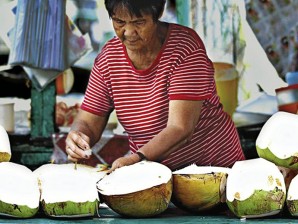
NATURAL PACKAGING . Coconut vendors in Lucena City expect brisk business after President Aquino noted after his arrival from the US on Friday that fit-conscious Americans are going cuckoo over coco water. DELFIN MALLARI JR./INQUIRER SOUTHERN LUZON
Agriculture officials are going loco over coco.
Officials plan to undertake a massive replanting and fertilization of coconut farmlands to meet the global market’s demand for coconut oil and other products like buko juice.
Agriculture Secretary Proceso Alcala stressed the need to revitalize the coconut industry following President Benigno Aquino III’s announcement that American investors were eager to buy coco water and other products from the country.
“The budget of the Philippine Coconut Authority (PCA) has been increased. There will be massive fertilization and replanting because our coconut trees are old,” Alcala said at a press briefing.
On his trip to the United States last week, Mr. Aquino said two American companies, Pepsi Co. and Vita Coco, had expressed interest in making fresh investments in the Philippine coconut industry to meet the international demand for coco water.
Healthy drink
Coco water is being touted as a healthy and an alternative natural sports drink because it contains in natural form electrolytes and minerals essential for rehydration.
Mr. Aquino said Vita Coco officials had told him during his US visit that they intended to invest $15 million in the country in the next four years.
Alcala said the PCA would send equipment to coconut farmers so that they could process their products and sell them at a higher price.
PCA Administrator Euclides Forbes said the agency was given a budget of P354 million for fertilization in 2012. The replanting budget was increased to P512 million from P60 million this year.
Salt
With the fertilization budget, the PCA can fertilize 96,000 hectares of coconut plantations with each tree given 2 kilos of salt a year, Forbes said.
Coconut trees thrive on sandy soil with a high level of salinity. The PCA wants to distribute salt from local salt farms to fertilize coconut plantations that are far from the coasts.
Alcala said the PCA would give priority to plantations in upland areas. Coconut plantations account for 27 percent of the country’s agricultural farms.
100,000 saplings
The PCA also plans to replant 100,000 saplings every year to replace the aging trees, according to Forbes.
A total of 44.8 million of the country’s 320 million coconut trees have been classified as old and senile.
Mature coconut trees bear few nuts or none at all, Forbes said. The trees, he said, should be cut and sold as coconut lumber.
The peak years of coconut trees are between 7 and 25 years old, when they bear between 40 and 65 nuts per year.
Forbes said the government should ensure that the country’s coconut plantations were robust because the demand for various coconut products was rising.
“We have many players here. They are all vying for coconuts,” he said.
World’s top exporter
The Philippines is the world’s top coconut exporter. In the first seven months of 2011, however, the export volume dropped 40 percent to 895,215.6 metric tons from the same period last year, the PCA said.
Despite the decline, coconut export receipts rose 34.7 percent to $1.22 billion from $908.72 million in the same period last year.